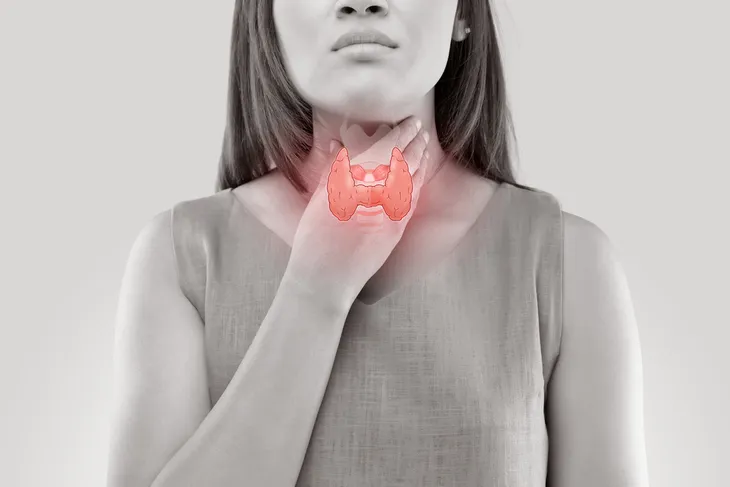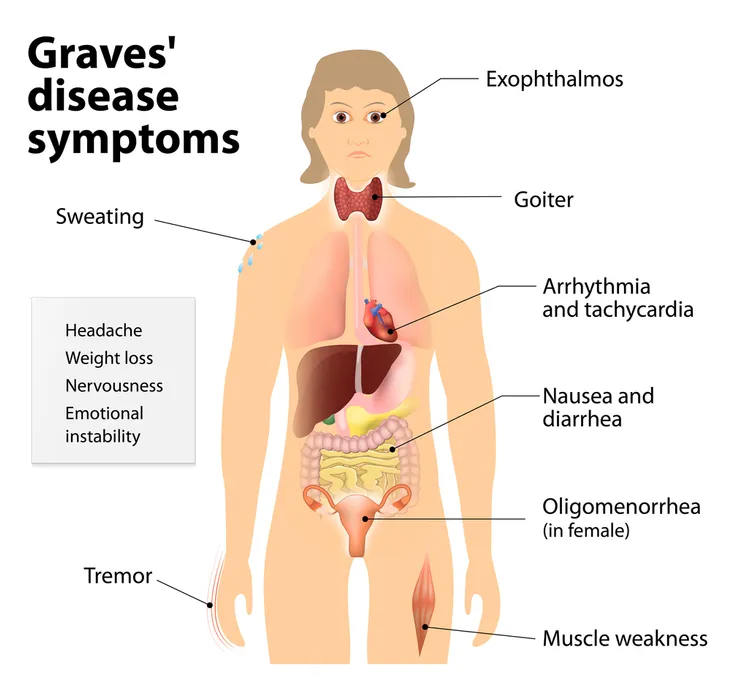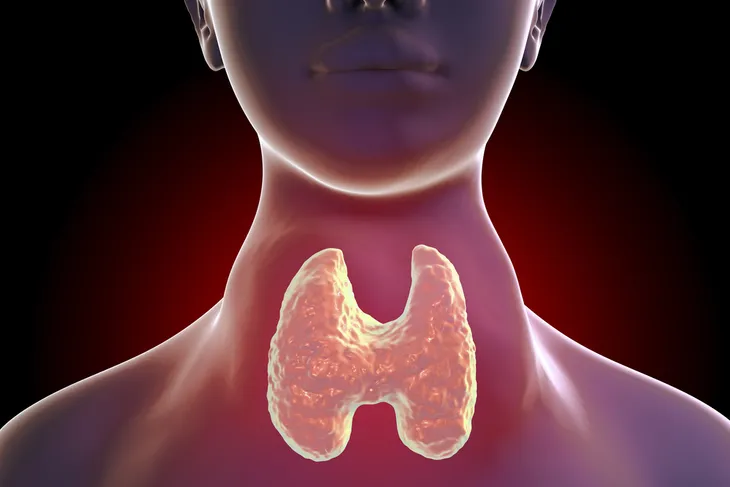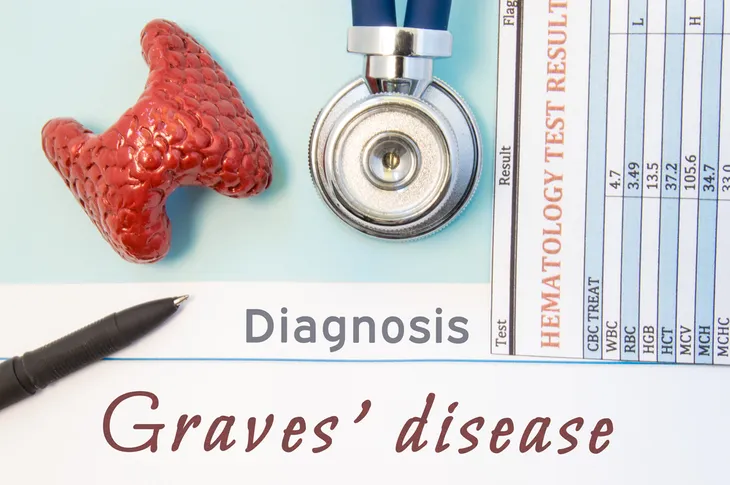There are many conditions that can affect the thyroid gland, commonly described as the butterfly-shaped gland in the neck. Graves’ disease is one of them. According to the Mayo Clinic, Graves’ disease is an immune disorder that results in the overproduction of thyroid hormones (hyperthyroidism). While there are many disorders that cause hyperthyroidism, Graves’ is one of the most common causes.
Graves’ disease can affect anyone, but it’s more common among women, particularly those under 40. This condition can cause a wide array of uncomfortable symptoms that can impact your overall wellbeing, but thankfully it’s also very treatable. To learn more about this disease, read up 13 things to know and how it affects patients…
What Is Graves’ Disease?
Graves’ disease is an autoimmune disorder of the thyroid that results in the overproduction of thyroid hormones, also known as an overactive thyroid or hyperthyroidism. The National Institute of Diabetes and Digestive and Kidney Diseases (NIDDK) writes, “With this disease, your immune system attacks the thyroid and causes it to make more thyroid hormone than your body needs.”
The impact of the disease on patients can vary from case to case, as thyroid hormones affect a number of functions in the body from how the body uses energy to the way our heart beats. If left untreated hyperthyroidism can create a number of complications in the body including problems with the heart, bones, muscles, menstrual cycle, and even fertility problems, says NIH.
Related Symptoms
Since Graves’ disease affects the thyroid hormones, it can have an effect on many of the body’s functions. WebMD lists the most common symptoms as “weight loss despite increased appetite, faster heart rate, higher blood pressure, and increased nervousness.” You may also experience excessive perspiration, sensitivity to heat, frequent bowel movements, muscle weakness, develop a goiter, bulging eyes, as well as a reddish, thickened, lumpy skin on the shins. Women may notice a change in the frequency or duration of their menstrual periods.
The source goes on to note that you should call your doctor immediately if you develop a fever, become agitated, or have a rapid pulse. “You could be having thyrotoxic crisis, in which the effects of too much thyroid hormone suddenly become life-threatening.”
Swelling of the Neck
If Graves’ disease is left untreated, you may develop physical symptoms, such as a goiter. This is an enlarged thyroid gland, says EndocrineWeb.com. When a goiter develops as a result of Graves’ disease, it is known as a diffuse thyrotoxic goiter. “As the thyroid gets bigger, the patient’s neck may begin to look full or swollen,” adds the source. “Sometimes a goiter makes swallowing difficult, causes coughing, and may disrupt sleep.”
Evidence in the Skin
Another physical symptom of Graves’ disease is a reddish, thickening of the skin on the shins, says NIDDK. This particular symptom is rare and will not happen to all patients, but some. It’s a condition known as pretibial myxedema or Graves’ dermopathy, adds the source.
While it might sound quite uncomfortable and look quite alarming, NIDDK notes that this rash is often painless and mild, but there have been instances where people have complained of it being painful.
Eyeing Graves’ Disease
According to the Mayo Clinic, about 30-percent of Graves’ patients will show signs of Graves’ ophthalmopathy. This condition occurs when the immune system attacks the muscles and other tissues around the eyes, explains NIDDK. The main symptom is inflammation and a buildup of tissue and fat behind the eye socket, causing bulging eyes. In rare cases, it can lead to vision loss.
Additional symptoms include a gritty sensation in the eyes, puffy or retracted eyelids, light sensitivity, reddened or inflamed eyes, pressure or pain in the eyes, and double vision, says the Mayo Clinic.
Main Causes
The Mayo Clinic explains the main cause of Graves’ disease as a “malfunction in the body’s disease-fighting immune system.” The reason for this is not exactly known.
In a healthy body, the immune system would react to a virus, bacteria, or other foreign substance by producing antibodies that target the threat. In a person with Graves’ disease, “the body produces an antibody to one part of the cells in the thyroid gland, a hormone-producing gland in the neck,” writes the Mayo Clinic.
In “normal” circumstances, the function of the thyroid is regulated by a hormone released by a gland at the base of the brain. This gland is called the pituitary gland. “The antibody associated with Graves’ disease — thyrotropin receptor antibody (TRAb) — acts like the regulatory pituitary hormone,” adds the source. As a result, the TRAb interferes with how the thyroid is supposed to function causing an overproduction of thyroid hormones (hyperthyroidism).
Risk Factors
Even though we previously said that any person can develop Graves’ disease, similar to many other health conditions, there are a number of risk factors that can increase a person’s chances of developing this condition. Family history is a major risk factor. What is known about this condition is that there is likely a gene(s) that make a person more susceptible. Gender also plays a role as women are more likely to develop Graves’ disease than men, as well as age. Graves’ disease tends to occur in people under the age of 40, says the Mayo Clinic.
Other risk factors would be any known autoimmune disorders like type 1 diabetes or rheumatoid arthritis. People with conditions that affect their immune system are at a higher risk. If you’re exposed to high levels of emotional or physical stress, these may “act as a trigger for the onset of Graves’ disease among people who are genetically susceptible,” adds the source. Also, pregnant women or those who have recently given birth may be at a higher risk, particularly if they are already genetically susceptible.
Lastly, smoking is another risk factor for Graves’ disease. Cigarettes can affect the body’s immune system which puts them at a higher risk. If you’re a smoker who has Graves’ disease, then you’re at a higher risk of developing Graves’ ophthalmopathy, notes the source.
Neonatal Graves’ Disease
The University of Rochester Medical Center says there’s such a thing as children and even infants being affected by this disease. “Graves disease occurs more often in children than in newborns. But it can also occur in newborn babies,” it explains.
The source warns if the disease is not diagnosed early in newborns, it can be fatal. It draws a direct genetic link to babies having the condition. “The mother’s antibodies can cross the placenta and affect the thyroid gland in the growing baby,” it says, adding not all babies will have it if their mother does. This can also unfortunately result in stillbirth, premature birth or miscarriage, it adds.
How to Diagnose
In order to diagnose Graves’ disease, you must visit your doctor. There are two different tests your doctor can perform and several different methods that can be used to rule out other conditions and make a conclusive diagnosis, says WebMD. First up, you’ll need to have a blood test done to check hormone levels, free thyroxine (free T-4), and triiodothyronine (free T-3). These hormones are produced and regulated by the thyroid. The test is looking to see if these levels are higher than normal. “If they are, and if levels of thyroid-stimulating hormone (TSH) in your blood are abnormally low, you are hyperthyroid, and Graves’ disease is likely the culprit,” explains WebMD.
Another common test that can help confirm a diagnosis is a radioactive iodine uptake test. This will look at whether or not large levels of iodine are collecting in the thyroid. “The gland needs iodine to make thyroid hormones, so if it is absorbing unusually large amounts of iodine, it obviously is producing too much hormone,” adds the source. WebMD also notes that if bulging eyes are the only symptom you’re experiencing, your doctor will likely only test for hyperthyroidism because this eye disease isn’t always related to Graves’ disease.
Treatment
As we said earlier, the only way to diagnose Graves’ disease for certain is to visit your doctor. Once you’ve done that and received a diagnosis, the overall goal of treatment is to restore thyroid hormone levels in order to relieve any associated symptoms. The three main treatment options are medicine, radioiodine therapy, and thyroid surgery, says NIDDK.
The most common treatment is radioiodine therapy which involves taking radioactive iodine-131 (I-131) which comes in the form of a pill or liquid, but medicine, such as beta-blockers and antithyroid medicines are also popular. Your doctor will develop a treatment plan based on the severity of your condition, your age, whether you are pregnant or have other medical conditions.
The Graves’ Diet
While there is no “Graves’ diet” per se, EndocrineWeb notes that diet can play a role in the severity of your symptoms. Certain foods will aggravate the condition and make it worse. In addition to medical treatment, there are some foods that can help manage the symptoms. It’s important to note that every person is different, so what works for some might not work for others.
Food that gets the green light includes calcium-rich foods like dairy, almonds, broccoli, and sardines, as well as choices high in vitamin D (to help absorb calcium) including sardines, cod liver oil, salmon, and mushrooms. Load up on antioxidant-rich berries and cruciferous vegetables. These may help reduce the amount of thyroid hormone that the gland produces, adds the source. You might also want to eat more lean protein and fast, such as foods high in omega-3 fatty acids. To get more information, talk to your doctor.
Foods to Avoid
There are foods that can make Graves’ disease worse, and therefore should be avoided. The biggest one is foods with iodine because people with Graves’ disease can be sensitive to the harmful side effects of iodine. Avoid eating foods with large amounts of this mineral such as kelp, dulse, or other kinds of seaweed, says NIDDK. Do not take iodine supplements.
Healthline also warns about eating gluten because “there is a higher incidence of Celiac disease in people who have thyroid disease than there is in the general population.” This may be due to a genetic link, warns the source. Foods that contain gluten are wheat, rye, barley, malt, triticale, brewer’s yeast, and all kinds of grains.















